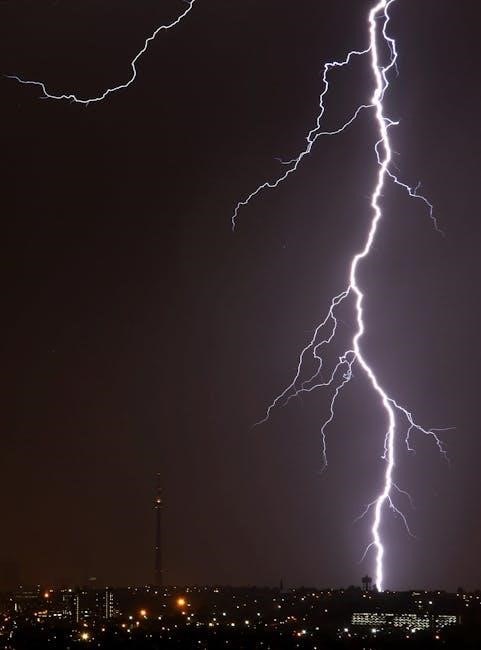Elie Wiesel’s Night is a haunting memoir about his Holocaust experiences. The 2006 translation includes a preface‚ Nobel speech‚ and study guides‚ offering insights into humanity’s resilience and moral struggles.
Overview of the Book
Night is a memoir by Elie Wiesel‚ detailing his harrowing experiences as a young Jewish boy during the Holocaust. First published in 1958‚ the book recounts Wiesel’s journey from his hometown in Sighet‚ Transylvania‚ to the horrors of Nazi concentration camps‚ including Auschwitz. The memoir is part of a trilogy‚ followed by Dawn and Day‚ and is widely regarded as one of the most important works on the Holocaust. The 2006 translation includes a new preface by Wiesel‚ reflecting on the enduring relevance of his story. It also features his Nobel Peace Prize acceptance speech‚ emphasizing his commitment to fighting injustice. The book is a deeply personal and emotional account‚ exploring themes of faith‚ survival‚ and the human spirit in the face of unimaginable evil. Its concise and powerful prose makes it a vital read for understanding the Holocaust’s impact on individuals and humanity.
The 2006 New Translation

The 2006 new translation of Night marks a significant update to Elie Wiesel’s original memoir. Translated by his wife‚ Marion Wiesel‚ this edition captures the emotional depth and complexity of the Holocaust experiences with renewed clarity. The translation includes a poignant preface by Elie Wiesel‚ reflecting on the enduring relevance of his story and its universal message of hope and resilience. Additionally‚ this version incorporates his Nobel Peace Prize acceptance speech‚ highlighting his advocacy for human rights and peace. The translation ensures that Wiesel’s powerful narrative remains accessible to new generations‚ preserving the authenticity of his voice while enhancing the readability of the text. This edition is widely praised for its faithful rendering of the original work‚ making it a vital resource for both educational and personal exploration of Holocaust history.
Preface to the New Translation
The preface to the 2006 new translation of Night is a deeply personal reflection by Elie Wiesel. He shares insights into the enduring relevance of his memoir‚ emphasizing its universal message of hope and resilience. Wiesel also discusses the emotional challenges of revisiting his Holocaust experiences‚ underscoring the importance of preserving Holocaust memory. The preface highlights the significance of the new translation in ensuring the story remains accessible to future generations. It also touches on the moral and ethical questions raised by the Holocaust‚ reinforcing the book’s timeless relevance. Wiesel’s preface serves as a bridge between the past and present‚ offering readers a deeper understanding of his journey and the broader implications of his story. This section is a poignant introduction to the memoir‚ setting the tone for the harrowing yet inspiring narrative that follows.
Nobel Peace Prize Acceptance Speech
Elie Wiesel’s Nobel Peace Prize acceptance speech‚ included in the 2006 translation of Night‚ is a powerful call to action for humanity. Delivered in 1986‚ Wiesel emphasizes the importance of peace‚ justice‚ and human rights. He reflects on his Holocaust experiences‚ urging the world to learn from the past and combat oppression. Wiesel’s speech is a testament to his lifelong advocacy for human dignity and his commitment to ensuring the Holocaust’s lessons are never forgotten. The speech complements the memoir‚ offering a broader perspective on Wiesel’s mission to foster understanding and compassion. It serves as a poignant reminder of the need for moral responsibility in addressing global injustices. This inclusion in the PDF provides readers with a deeper understanding of Wiesel’s legacy beyond his literary work‚ highlighting his impact as a moral leader and advocate for peace.
List of Elie Wiesel’s Other Works
Elie Wiesel was a prolific writer‚ and his works extend far beyond Night. Some of his notable writings include Dawn‚ the sequel to Night‚ which explores the aftermath of the Holocaust‚ and Day‚ the final book in the trilogy‚ offering reflections on hope and healing. Wiesel also authored Man’s Search for Meaning‚ a philosophical exploration of faith and survival‚ and Souls on Fire‚ a collection of stories about Jewish mysticism. His memoirs‚ such as All Rivers Run to the Sea and And the Sea Is Never Full‚ provide deeper insights into his life and legacy. These works‚ often included in the Night PDF‚ showcase Wiesel’s profound contributions to Holocaust literature and his commitment to sharing the human experience.

Historical Context of “The Night PDF”
Elie Wiesel’s Night reflects the Holocaust’s historical context‚ detailing Nazi Germany’s systematic persecution of Jews‚ Auschwitz’s atrocities‚ and the genocide’s lasting impact on humanity and modern historical understanding.
Elie Wiesel’s Background

Elie Wiesel was born in 1928 in Sighet‚ Romania‚ to a Jewish family. He grew up in a religious household and studied Jewish texts from an early age. During World War II‚ at just 15‚ Wiesel and his family were deported to Auschwitz‚ where his mother and younger sister perished. He and his father were later transferred to Buchenwald‚ where his father died. After the war‚ Wiesel became a journalist and writer‚ dedicating his life to sharing the horrors of the Holocaust. In 1986‚ he was awarded the Nobel Peace Prize for his advocacy against violence and discrimination. Wiesel authored over 60 books‚ including Night‚ which is part of a trilogy that also includes Dawn and Day; His work has become a cornerstone of Holocaust literature‚ offering a personal and profound account of survival and resilience.
The Holocaust and Its Impact
The Holocaust‚ one of the darkest periods in human history‚ was the systematic extermination of six million Jews by the Nazis during World War II. It destroyed entire communities‚ leaving deep emotional and psychological scars on survivors like Elie Wiesel. The genocide not only erased millions of lives but also shattered families‚ cultures‚ and faith in humanity. Wiesel’s memoir Night captures the horrors of Auschwitz and Buchenwald‚ reflecting the loss of innocence and faith. The Holocaust’s impact extends beyond individual trauma‚ influencing global awareness of human rights and genocide prevention. It remains a stark reminder of the dangers of hatred‚ intolerance‚ and authoritarianism. The Holocaust’s legacy continues to shape education‚ literature‚ and international laws‚ ensuring that such atrocities are never forgotten or repeated.
Concentration Camps

Concentration camps were central to the Holocaust‚ serving as sites of mass imprisonment‚ forced labor‚ and extermination. Auschwitz and Buchenwald‚ where Elie Wiesel was detained‚ exemplify the brutal conditions faced by millions. Prisoners endured starvation‚ disease‚ and relentless brutality‚ with many subjected to inhumane medical experiments. These camps were designed to dehumanize and eliminate‚ stripping individuals of their identity and dignity. The atrocities committed within their walls left survivors with profound physical and emotional scars. Wiesel’s account in Night vividly portrays the horrors of camp life‚ including the separation of families‚ the constant fear of death‚ and the moral dilemmas posed by survival. The concentration camps remain a stark reminder of humanity’s capacity for evil and the importance of vigilance against oppression.
Auschwitz Experiences

Elie Wiesel’s experiences in Auschwitz are central to Night‚ detailing the horrors of the camp. Upon arrival‚ he was separated from his mother and sisters‚ never to see them again. The brutal conditions‚ including forced labor‚ starvation‚ and constant fear of death‚ are vividly described. Wiesel recounts the psychological toll of witnessing executions‚ crematoriums‚ and the dehumanizing treatment of prisoners. Auschwitz became a place where hope faded‚ and faith was tested. The memoir captures the moral dilemmas faced by prisoners‚ such as survival guilt and the loss of humanity. Wiesel’s account of Auschwitz serves as a powerful testament to the atrocities of the Holocaust‚ highlighting the resilience of the human spirit even in the face of unimaginable suffering. His experiences in Auschwitz shaped his advocacy for peace and human rights‚ leaving a lasting legacy.
Significance of the Holocaust in Modern History
The Holocaust remains a pivotal event in modern history‚ shaping global consciousness about human rights and genocide prevention. Night by Elie Wiesel serves as a testament to its enduring impact‚ offering a personal narrative that underscores the atrocities committed. The Holocaust led to the establishment of international laws against genocide and the formation of institutions dedicated to peace and justice. It also sparked widespread education and awareness campaigns to combat prejudice and promote tolerance. Wiesel’s advocacy‚ rooted in his experiences‚ has influenced global dialogue on ethical responsibility and the importance of remembering past atrocities to prevent future ones. The Holocaust’s lessons continue to resonate‚ reminding humanity of the dangers of hatred and the necessity of vigilance in protecting human dignity. Through memoirs like Night‚ the Holocaust’s significance is preserved‚ ensuring its lessons are not forgotten.


Literary Significance of “The Night PDF”
Night is a profound exploration of humanity’s darkest hour‚ offering a deeply personal account of the Holocaust. Its haunting narrative has made it a cornerstone of Holocaust literature‚ resonating universally.
Themes in “Night”
Elie Wiesel’s Night explores profound themes that resonate deeply with readers. The memoir delves into the loss of faith‚ as Eliezer struggles with his religious beliefs amidst unimaginable suffering. The Holocaust forces him to question God’s existence and justice‚ reflecting the broader crisis of faith experienced by many victims. Another central theme is human resilience‚ as Eliezer and others endure unimaginable horrors‚ clinging to hope and survival instincts. The memoir also examines morality in extreme conditions‚ highlighting the ethical dilemmas faced in concentration camps‚ where survival often required impossible choices. These themes‚ intertwined with Wiesel’s vivid recounting of his experiences‚ make Night a powerful exploration of humanity’s darkest and most revealing moments.
Loss of Faith
The theme of loss of faith in Night is deeply personal and profound. Eliezer’s journey from a devout young boy to a questioning survivor is central to the narrative. In Auschwitz‚ he witnesses unimaginable atrocities‚ leading him to doubt God’s existence and justice. The hanging of a young boy in the camp is a pivotal moment‚ as Eliezer hears someone lament‚ “Where is God now?” This question haunts him‚ symbolizing the erosion of his faith. Wiesel’s portrayal of this spiritual crisis is raw and unflinching‚ reflecting the broader theological struggles of many during the Holocaust. The loss of faith is not just individual but collective‚ as the community’s trust in a benevolent God falters. This theme underscores the Holocaust’s profound impact on spiritual and philosophical beliefs‚ leaving an indelible mark on Eliezer’s identity and worldview.
Human Resilience
Amidst the horrors of the Holocaust‚ Night highlights the extraordinary resilience of the human spirit. Despite unimaginable suffering‚ Eliezer and other prisoners find ways to endure‚ often through small acts of kindness and hope. The bond between Eliezer and his father serves as a testament to resilience‚ as they rely on each other for survival. Even in the face of extreme adversity‚ moments of humanity persist‚ such as prisoners sharing meager food or offering comfort. Wiesel illustrates that resilience is not about the absence of despair but the capacity to cling to hope‚ even when it seems futile. This theme underscores the strength of the human spirit‚ showing how individuals can find ways to persevere in the darkest of times‚ preserving their dignity and humanity against overwhelming odds.
Morality in Extreme Conditions
In Night‚ Elie Wiesel explores the profound moral challenges faced in the Holocaust‚ where the boundaries of humanity were pushed to the limit. The novel examines how individuals grappled with ethical dilemmas amidst unimaginable suffering. Eliezer’s internal conflict between hope and despair‚ as well as his father’s unwavering commitment to survival‚ illustrate the struggle to maintain moral integrity in a morally bankrupt environment. The harsh realities of the concentration camps forced prisoners to confront questions of right and wrong in extreme conditions. Wiesel highlights the erosion of morality under Nazi rule‚ yet also reveals moments of compassion and solidarity among victims‚ showing that even in the darkest times‚ the human capacity for ethical behavior persisted. This theme serves as a powerful reflection on the resilience of moral values in the face of overwhelming evil.
Literary Style and Structure
Elie Wiesel’s Night is renowned for its powerful and poignant literary style‚ which deeply immerses readers in the horrors of the Holocaust. Wiesel employs a direct‚ emotional narrative voice‚ blending simplicity with profound depth to convey the atrocities he witnessed. The memoir’s structure is chronological‚ tracing Eliezer’s journey from his home in Sighet to the concentration camps‚ creating a sense of relentless progression. Wiesel uses vivid imagery and symbolism‚ such as the recurring motif of night‚ to represent the darkness and despair of the Holocaust. His prose is both haunting and evocative‚ capturing the emotional and psychological toll of extreme suffering. The book’s concise yet impactful language underscores the gravity of its themes‚ making it a masterpiece of Holocaust literature. Wiesel’s writing style ensures that the reader experiences the emotional weight of his story‚ fostering a deeper understanding of the human cost of such events.
Comparison with Other Holocaust Memoirs
Night stands out among Holocaust memoirs for its unique blend of personal narrative and philosophical reflection. Unlike works like Viktor Frankl’s Man’s Search for Meaning‚ which focuses on psychological resilience‚ Wiesel’s memoir delves deeply into the spiritual and existential crises faced during the Holocaust. While Primo Levi’s If This Is a Man offers a detailed‚ almost clinical account of life in Auschwitz‚ Wiesel’s prose is more lyrical and emotionally charged. Night is often praised for its ability to transcend individual experience‚ speaking to universal themes of faith‚ hope‚ and humanity. Its concise and impactful structure makes it more accessible than longer‚ more detailed accounts‚ yet it retains a profound depth that resonates with readers. This distinction has made Night one of the most widely read and studied Holocaust memoirs‚ providing a unique perspective on one of history’s darkest chapters.

Educational Resources Related to “The Night PDF”
Study guides‚ chapter summaries‚ and discussion questions enhance understanding of Night. Teaching activities and PDF downloads provide accessible resources for educators and students.
Study Guides
Study guides for Night provide comprehensive resources for understanding the memoir. They include objectives‚ topics‚ and activities for engaging with the text. These guides often feature chapter summaries‚ discussion questions‚ and analysis of key themes like faith and resilience. Additionally‚ they may offer teaching agendas for educators to structure lessons effectively. Many study guides are available in downloadable formats‚ such as PDFs‚ making them accessible for students and teachers. These resources help deepen the exploration of Wiesel’s experiences and the historical context of the Holocaust. By focusing on critical thinking and reflection‚ study guides enhance the learning process‚ ensuring a meaningful connection to the text. They are invaluable tools for both individual study and classroom discussions.
Chapter Summaries
Chapter summaries of Night provide detailed overviews of each section‚ highlighting key events‚ themes‚ and character developments. These summaries help readers grasp the narrative flow and emotional depth of Elie Wiesel’s memoir. They outline the harrowing journey of Eliezer‚ from his peaceful life in Sighet to the horrors of Auschwitz. Summaries emphasize the loss of innocence‚ the struggle with faith‚ and the father-son bond. They also highlight pivotal moments‚ such as the arrival at Auschwitz and the brutal conditions in the concentration camps. By condensing complex emotions and events‚ chapter summaries make the memoir more accessible. They serve as valuable tools for understanding the historical context and the psychological impact of the Holocaust on individuals. These summaries are often included in study guides and are widely available online in PDF and text formats for educational purposes. They provide a clear roadmap for analyzing Wiesel’s powerful narrative;
Discussion Questions
Discussion questions for Night encourage deeper reflection on Elie Wiesel’s memoir. They explore themes like faith‚ survival‚ and morality in extreme conditions. Questions often focus on Eliezer’s journey‚ his relationship with his father‚ and the psychological impact of the Holocaust. Some examples include: How does Eliezer’s faith evolve throughout the story? What role does hope play in survival? How does Wiesel portray the moral dilemmas faced in the camps? These questions prompt readers to consider the broader implications of the Holocaust and its relevance today. They also invite analysis of Wiesel’s literary style and the emotional weight of his narrative. Discussion questions are frequently included in study guides and are valuable for educational settings‚ fostering meaningful conversations about the book’s profound themes. They help readers connect the historical context to personal reflections on humanity and resilience.
Teaching Activities
Teaching activities for Night aim to deepen students’ understanding of Elie Wiesel’s memoir. Educators often use interactive approaches‚ such as reflective writing prompts‚ group discussions‚ and multimedia projects. One common activity involves asking students to create a timeline of Eliezer’s journey‚ highlighting key events and emotional shifts. Another activity encourages students to write a diary from the perspective of a character‚ exploring their thoughts and feelings. Additionally‚ teachers may assign a comparative analysis of Night with other Holocaust memoirs or historical documents. Some classrooms incorporate debates on themes like morality in extreme conditions or the role of hope in survival. These activities foster critical thinking‚ empathy‚ and a deeper connection to the text. They also help students navigate the complex emotional and historical landscape of Wiesel’s narrative‚ making the learning experience both engaging and meaningful.
Download and Access Information
Night by Elie Wiesel is available as a free PDF download‚ along with Word Doc and Text File options. It can also be accessed on various online reading platforms worldwide.
Free PDF Download Options
Elie Wiesel’s Night can be downloaded for free in PDF format from various online platforms. Websites like Docsity and educational repositories offer the full text‚ including the preface and Nobel speech. Additionally‚ some platforms provide complementary study guides‚ chapter summaries‚ and discussion questions to enhance understanding. The PDF is fully searchable and compatible with multiple devices‚ ensuring accessibility. Users can also find versions optimized for mobile reading‚ making it convenient to access on smartphones and tablets. These free resources make Wiesel’s powerful memoir widely available for educational and personal reflection‚ ensuring his story reaches a global audience. The ease of access highlights the enduring relevance of Night in understanding the Holocaust and its impact on humanity.

Word Doc and Text File Availability
Elie Wiesel’s Night is available not only in PDF but also as Word documents and text files. These formats are accessible through various online platforms‚ including educational repositories and document-sharing sites like Google Docs and Scribd. The Word Doc version allows users to edit and annotate the text‚ making it ideal for students and educators preparing study materials. Text files provide a lightweight and easily readable option for those who prefer minimal formatting. Both formats retain the full content of the memoir‚ including the preface to the new translation and the Nobel Peace Prize acceptance speech. This versatility ensures that readers can engage with Wiesel’s powerful narrative in the format that best suits their needs. Additionally‚ these files are widely compatible with different devices‚ ensuring accessibility for a broad audience.
Online Reading Platforms
Elie Wiesel’s Night is accessible on various online platforms‚ enabling readers to engage with the memoir conveniently. Platforms like Scribd‚ Google Books‚ and Project Gutenberg offer digital versions‚ including PDFs‚ for easy access. Some platforms provide free previews‚ while others require a subscription or purchase for full access. Additionally‚ educational websites and libraries often include Night in their digital collections‚ making it readily available for students and researchers. These platforms ensure that Wiesel’s important work remains widely accessible‚ allowing readers to reflect on its historical and moral significance without the need for physical copies. The availability of Night online underscores its enduring relevance and the importance of preserving Holocaust testimonies for future generations.



